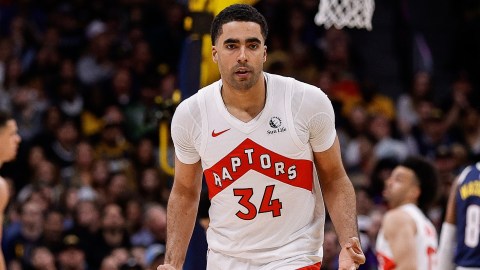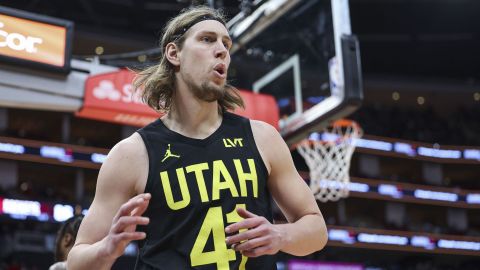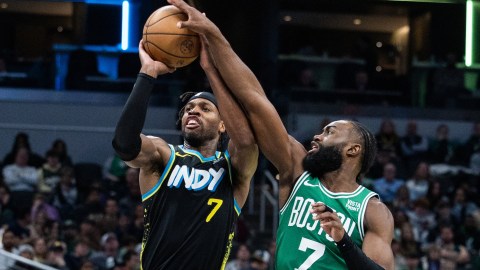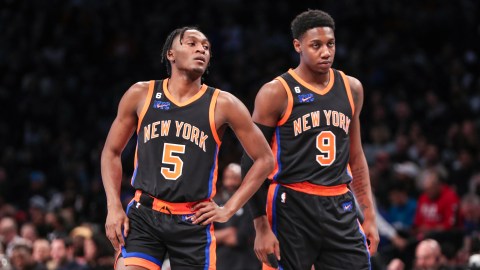 While admiring the job Brad Stevens has done as coach of the Celtics this season, Doc Rivers offered an unassailable fact about rebuilding and tanking in the NBA.
While admiring the job Brad Stevens has done as coach of the Celtics this season, Doc Rivers offered an unassailable fact about rebuilding and tanking in the NBA.
“It’s tough to rebuild,” Rivers said, “when you’ve got good players.”
No team appears to know that better than the Toronto Raptors — which may be why they’re going about remedying that particular problem with their own roster.
Four days after dealing nominal star player Rudy Gay to the Sacramento Kings, the Raptors reportedly are interested in trading starting point guard Kyle Lowry to the New York Knicks for Raymond Felton, Metta World Peace and a 2018 draft pick. In a span of a week, the Raptors have gone from holding first place in the putrid Atlantic Division to announcing to the NBA at large that the tank-a-thon is on north of the border.
Make no mistake, that is precisely what the Raptors are saying by exploring the reported Knicks trade, or any trade involving Lowry, which the Raptors appear determined to do. In the aftermath of the Gay deal, Toronto general manager Masai Ujiri talked about Gay’s “fit” — or lack thereof — and the financial flexibility gained by the transaction. Even in losing a perennial 18-points-per-game scorer, the Raptors could justify the move in terms of its payroll gain, which is slightly different from the concept of “tanking.”
Every team is constantly looking for a more favorable payroll situation, after all, so even when the talent it receives in return is underwhelming, a team that makes a trade can always justify its actions by talking about the luxury tax or about shedding cap holds for future free agent moves. Tanking, meanwhile, simply involves putting the worst product possible on the court, no matter the business-related factors.
Gay has two years and $37 million remaining on his contract, including this season, while three of the four players who came to Toronto in return — Greivis Vasquez, John Salmons and Patrick Patterson — can all be let go at the end of the season. Only Chuck Hayes has a guaranteed contract beyond this summer. In swapping Gay, along with Aaron Gray and Quincy Acy, for all those expiring contracts, the Raptors set themselves up to be comfortably below the salary cap after the season. Trading Gay doesn’t have to be a clarion call that a team is going in the tank, as the Memphis Grizzlies proved in reaching the Western Conference finals after selling Gay off to Toronto last season.
The proposed Lowry trade is a completely different animal. As recognizable a face as Gay was, he wasn’t playing well at all and has always been disliked by NBA observers who value efficiency over raw scoring. He was shooting a career-worst 39 percent from the field for the Raptors and his 15.9 PER was criminally low for a player with a 30.3 usage rate. With the high price tag included, it was a minor miracle the Raptors were able to find a taker for Gay at all.
By contrast, Lowry might be the Raptors most desirable available player. (Yes, you’d probably want Jonas Valanciunas over Lowry; no, Valanciunas is not available.) He makes a reasonable $6.2 million this season, after which his contract expires. He averages 14.6 points, 6.7 assists and 1.8 steals per game, with a respectable 17.5 PER. All told, he’s a not-awful point guard with a not-awful contract.
Felton has no such redeeming qualities. He’s turned back into a pumpkin after one productive season in New York, shooting less than 40 percent from the field for the third time in his nine-year career and posting a career-worst 11.4 points per 36 minutes. And he’s now out two to three weeks with a strained left hamstring. World Peace is good for some physical defense, a few head-scratching tweets and not much more at this stage. The 2018 draft pick could be a boon or a non-factor, since the Knicks’ fortunes from year to year are as predictable as a coin flip.
What such a trade does for the Raptors, though, is make them much worse right away, which is probably the whole point. They don’t really want to be good. Ujiri is a champion of the new-school front office mentality, popularized by Houston’s Daryl Morey and Oklahoma City’s Sam Presti, which holds that building through the draft — and by extension rookie contracts — is the most efficient means to build a winner. And next year’s draft is believed to be flush with just the types of players who can provide star-level production at a relatively small starting cost. This deal should increase the Raptors’ chances of being really bad from here on.
In other words, this is tanking at its best.
Let’s be clear: Nobody is condemning Ujiri or the Raptors here. They are doing what they feel needs to be done, and finishing ahead of the Sixers or Celtics in the division standings wouldn’t be much of a consolation prize for forfeiting all their lottery balls in the Andrew Wiggins sweepstakes. As constructed, the Raptors are probably headed to New York for the lottery anyway, but this would just about cement their seat there next spring.
As Rivers noted, it’s tough to tank when you have good players. It’s a lot easier, of course, when you don’t.
Have a question for Ben Watanabe? Send it to him via Twitter at @BenjeeBallgame or send it here.



